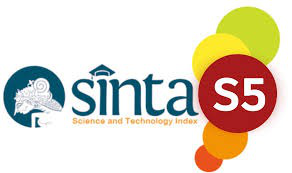DUMPSTER DIVING THREAT IN PERSONAL DATA LEAKAGE CASE IN INDONESIA
Abstract
Keywords
Full Text:
PDFReferences
Alghazo, J., Ouda, O. K., & Hassan, A. E. (2018). E-waste environmental and information security threat: GCC countries vulnerabilities. Euro-Mediterranean Journal for Environmental Integration, 3, 1-10.
Al-Kassimi, K. (2021). De-Historicizing (Mainstream) Ottoman Historiography on Tanzimat and Tahdith: Jus Gentium and Pax Britannica Violate Osmanli Sovereignty in Arabia. Histories, 1(4), 218-255.
Borkovich, D. J., & Skovira, R. J. (2019). Cybersecurity Inertia And Social Engineering: Who's Worse, Employees Or Hackers?. Issues in Information Systems, 20(3).
Clarke, L., Arnett, S., Bukhari, W., Khalilidehkordi, E., Jimenez Sanchez, S., O'Gorman, C., ... & Broadley, S. A. (2021). MRI patterns distinguish AQP4 antibody positive neuromyelitis optica spectrum disorder from multiple sclerosis. Frontiers in neurology, 12, 722237.
Cooper, A. S. (2008). Showdown at Doha: The secret oil deal that helped sink the Shah of Iran. The Middle East Journal, 62(4), 567-591.
El-Gayar, O., & Fritz, B. D. (2006). Environmental management information systems (EMIS) for sustainable development: a conceptual overview. Communications of the Association for Information Systems, 17(1), 34.
El-Gayar, O., & Fritz, B. D. (2006). Environmental management information systems (EMIS) for sustainable development: a conceptual overview. Communications of the Association for Information Systems, 17(1), 34.
Ferza, R., Hamudy, M. I. A., & Rifki, M. S. (2019). Public Private Partnership of Waste Management in West Java. BISNIS & BIROKRASI: Jurnal Ilmu Administrasi dan Organisasi, 26(2), 4.
Gehl, R. W., & Lawson, S. T. (2022). Social Engineering: How Crowdmasters, Phreaks, Hackers, and Trolls Created a New Form of Manipulativ e Communication. MIT Press.
Ghafir, I., Saleem, J., Hammoudeh, M., Faour, H., Prenosil, V., Jaf, S., ... & Baker, T. (2018). Security threats to critical infrastructure: the human factor. The Journal of Supercomputing, 74, 4986-5002.
Gregg, M., Watkins, S., Mays, G., Ries, C., Bandes, R. M., & Franklin, B. (2006). Hack the stack: Using snort and ethereal to master the 8 layers of an insecure network. Elsevier.
Hijji, M., & Alam, G. (2021). A multivocal literature review on growing social engineering based cyber-attacks/threats during the COVID-19 pandemic: challenges and prospective solutions. Ieee Access, 9, 7152-7169.
Janczewski, L. J., & Fu, L. (2010, October). Social engineering-based attacks: Model and new zealand perspective. In Proceedings of the international multiconference on computer science and information technology (pp. 847-853). IEEE.
Khan, D., & Samadder, S. R. (2014). Municipal solid waste management using Geographical Information System aided methods: A mini review. Waste management & research, 32(11), 1049-1062.
Lehtonen, T. K., & Pyyhtinen, O. (2021). Living on the margins: dumpster diving for food as a critical practice. Distinktion: Journal of Social Theory, 22(3), 441-463.
Listokin, Y., & Schizer, D. M. (2012). I like to pay taxes: Taxpayer support for government spending and the efficiency of the tax system. Tax L. Rev., 66, 179.
Lu, W., Chen, X., Peng, Y., & Shen, L. (2015). Benchmarking construction waste management performance using big data. Resources, Conservation and Recycling, 105, 49-58.
Medlin, B. D., Cazier, J. A., & Foulk, D. P. (2008). Analyzing the vulnerability of US hospitals to social engineering attacks: how many of your employees would share their password?. International Journal of Information Security and Privacy (IJISP), 2(3), 71-83.
Ramjist, J. K., Coburn, N., Urbach, D. R., Govindarajan, A., Armstrong, K. A., Scott, A. L., & Baxter, N. N. (2018). Disposal of paper records containing personal information in hospitals. JAMA, 319(11), 1162-1163.
Rombach, M., & Bitsch, V. (2015). Food movements in Germany: Slow food, food sharing, and dumpster diving. International Food and Agribusiness Management Review, 18(1030-2016-83042), 1-24.
Sagar, R. (Ed.). (2022). The Progressive Maharaja: Sir Madhava Rao's Hints on the Art and Science of Government. Oxford University Press.
Siddiqi, M. A., Pak, W., & Siddiqi, M. A. (2022). A study on the psychology of social engineering-based cyberattacks and existing countermeasures. Applied Sciences, 12(12), 6042.
DOI: https://doi.org/10.46336/ijeer.v3i2.419
Refbacks
- There are currently no refbacks.
Copyright (c) 2023 Sayid Muhammad Rifki Noval, Soecipto Soecipto, Ahmad Jamaludin, Erna Listiawati
Published By:
IJEER: Jalan Riung Ampuh No. 3, Riung Bandung, Kota Bandung 40295, Jawa Barat, Indonesia
IJEER Indexed By:
 This work is licensed under a Creative Commons Attribution 4.0 International License.
This work is licensed under a Creative Commons Attribution 4.0 International License.









